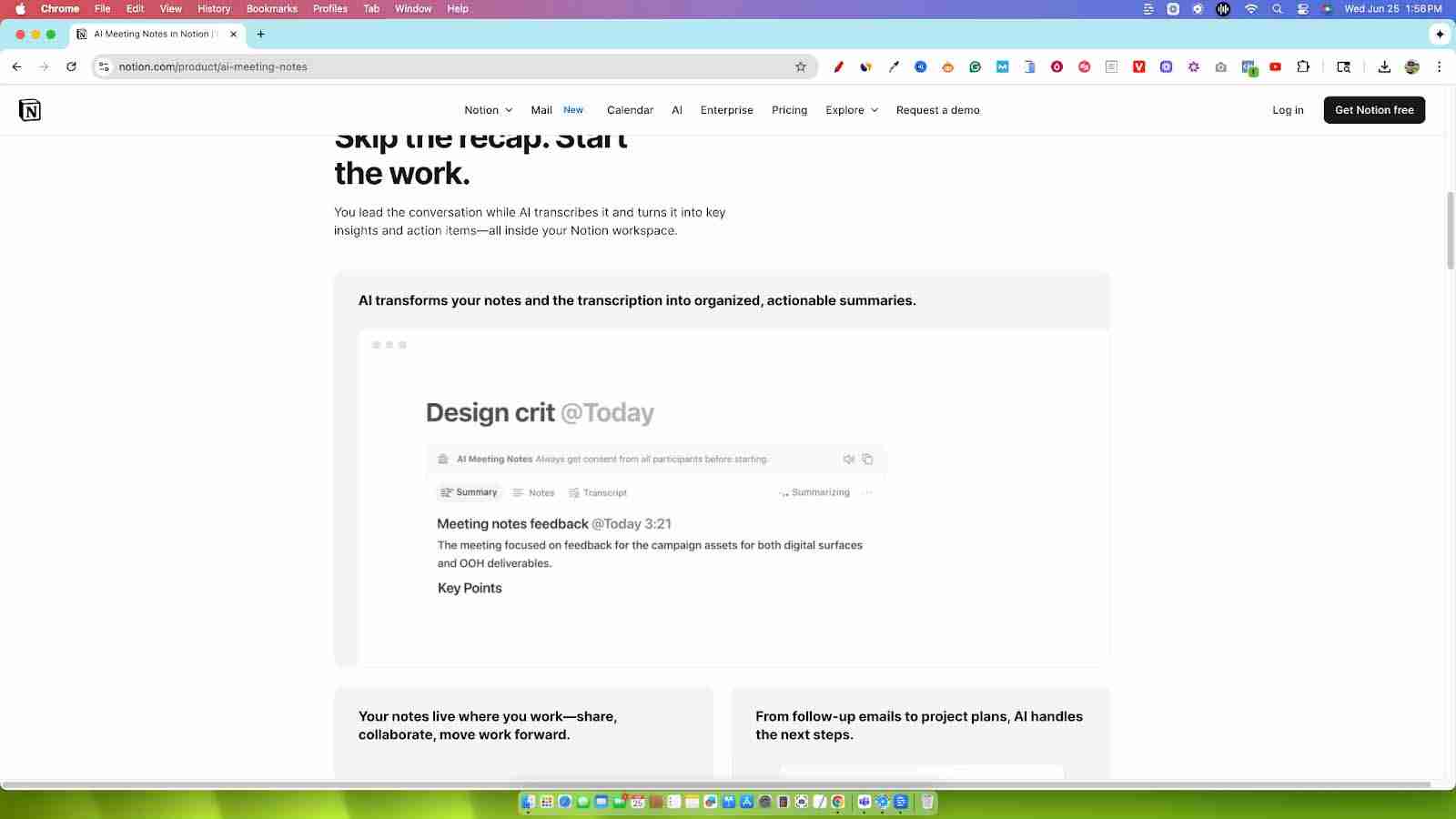What is Notion? Features, Pros & Cons, and Alternatives
Notion is a connected digital workspace that lets you take notes, manage projects, build wikis, and create databases in one place. Read my hands-on take to see how well Notion works in practice.

If you've been in the productivity space, you've heard of Notion. It's an application that gets a lot of hype, with nearly 17 million monthly visits. I’ve spent some time with it to figure out what it’s all about and who can get the most out of it.
For more info, feel free to watch my full video review below.
What is Notion?
Notion is a powerful, all-in-one workspace that combines note-taking, project management, and knowledge organization into a single, highly customizable platform. Think of it as a hybrid of Microsoft Excel and Microsoft Access, but with a much friendlier user interface. It allows you to create databases, documents, and wikis, and connect them in a way that makes sense for your workflow. The platform is designed to be a blank canvas, letting you build whatever you need to manage your work and life.
What is Notion Used For?
Note-taking
At its core, Notion is a great place for taking notes. You can store everything from quick thoughts and meeting minutes to in-depth research articles and web clippings. It offers a clean, distraction-free writing environment and the ability to organize your notes with tags, pages, and databases, making it easy to find what you need later.

Knowledge management
Notion excels at creating internal wikis for teams. This is perfect for documenting processes, sharing institutional knowledge, and creating a central source of truth for your organization. For example, a marketing team could build a wiki containing brand guidelines, content calendars, and campaign results, all interlinked for easy access.
Project and task management
You can use Notion to build project boards with customizable views like lists, Kanban boards, and calendars. It’s capable of managing both individual and team tasks, setting deadlines, and assigning responsibilities. This makes it a great tool for collaborating on projects and tracking progress from start to finish.
Personal organization
On a personal level, Notion can be your digital planner. Many people use it to create to-do lists, track habits, set personal goals, and manage their daily schedules. For instance, you could have a dashboard that shows your weekly tasks, a habit tracker, and your long-term goals all in one place.
Other uses
The flexibility of Notion means it can be adapted for many other purposes. Some people use it as a lightweight CRM to track client relationships. Others use it for content planning for their blogs or YouTube channels, or even for tracking personal finances.
Who Uses Notion?
Individuals
Many individuals use Notion for personal organization, note-taking, and managing freelance projects. It's a great tool for students to organize class notes and assignments or for anyone looking to bring more structure to their personal life.
Teams
Notion is popular among teams of all sizes. Design teams use it to create mood boards and manage design sprints. Marketing teams plan campaigns and track content calendars, while IT teams can use it to document internal processes and manage support tickets.
Businesses
From startups to large enterprises, businesses use Notion to create a central hub for their operations. Startups appreciate the flexibility and low cost, while small to medium-sized businesses (SMBs) use it to streamline workflows. Even enterprise companies and educational institutions like schools are adopting it for knowledge management and collaboration.
What are the Main Features of Notion?
Notion AI
Notion has integrated AI features that can help with writing, summarizing, and brainstorming. For example, you can use AI to create a simple note-taking app from a text prompt or summarize a long document into key points. I found it quite handy for creating simple things quickly.
Wikis
This feature allows you to build a centralized knowledge base for your team or personal use. You can create interconnected pages to store important information, making it easy for everyone to find what they need without having to ask around.
Docs
Notion Docs are flexible documents where you can write, plan, and collaborate. You can embed images, videos, and even other Notion pages within a doc, creating rich, dynamic content. This is useful for everything from project proposals to team meeting notes.
Projects
Notion Projects provides a suite of tools for managing tasks and projects. You can visualize your work with Kanban boards, calendars, and timelines. A practical use case is managing an affiliate promotion schedule by tracking launch dates, marketing ideas, and progress all in one place.
Forms
You can now create forms directly in Notion to collect information and have it automatically populate a database. This is great for gathering feedback, collecting survey responses, or managing registrations without needing a third-party tool.
Sites
Notion allows you to turn any page into a simple website. This is perfect for creating a personal portfolio, a help center for your product, or a public-facing knowledge base. You can publish your content to the web with just a few clicks.
Enterprise Search (New)
For larger organizations, Enterprise Search allows employees to find information across all their company's connected tools, like Slack, Google Drive, and Confluence, directly from Notion. This saves time by providing a single search bar for all company knowledge.
AI Meeting Notes (New)
This new feature can automatically transcribe and summarize your meetings from Google Meet or Zoom. It can pull out action items and key takeaways, saving you the trouble of manually typing up notes after a call.
What are the Pros of Notion?
- Highly Customizable: The best thing about Notion is its flexibility. You can build almost any kind of workflow you need, from a simple to-do list to a complex project management system.
- All-in-One Workspace: It brings together notes, tasks, and wikis, which can replace the need for multiple different apps. This helps create a single source of truth for your business or personal life.
- Powerful Databases: The ability to create and link databases is a standout feature. It allows you to organize and view your data in multiple ways, such as tables, boards, lists, and calendars.
- Clean and Minimalist Interface: The UI is clean and doesn't get in your way, allowing you to focus on your work.
- Strong Community and Templates: There's a huge community of Notion users who create and share templates for almost any use case imaginable. This makes it easy to get started without having to build everything from scratch.
What are the Cons of Notion?
- Steep Learning Curve: While it's easy to get started with the basics, mastering Notion's more advanced features, especially databases, can be challenging. There is a learning curve if you want to move beyond simple note-taking.
- Performance Can Be Slow: When you have a lot of content and complex databases in your workspace, Notion can sometimes feel a bit sluggish.
- Free Plan is Limited: To get the most out of Notion, you really need a paid plan. The free plan has limitations, especially when it comes to features like charts, which are a game-changer for data visualization. I found that I hit the limits of the free plan very quickly.
- Offline Mode Isn't Perfect: While Notion does have an offline mode, it can sometimes be unreliable. You might find that some pages are not available or that syncing issues occur when you reconnect.
How Much Does Notion Cost?
Notion offers a few different pricing tiers. To really unlock its power, especially the data visualization tools like charts, you'll need to move to a paid plan. I can tell you from my experience that you’ll quickly outgrow the free version if you plan to use it seriously.
| Plan | Billed Annually | Billed Monthly | Key Features |
|---|---|---|---|
| Free | $0 | $0 | Basic block storage, limited charts, invite up to 10 guests. |
| Plus | $8 per user/month | $10 per user/month | Unlimited blocks, unlimited file uploads, unlimited charts, 30-day page history. |
| Business | $15 per user/month | $18 per user/month | Everything in Plus, plus SAML SSO, private teamspaces, advanced page analytics. |
| Enterprise | Custom Pricing | Custom Pricing | Everything in Business, plus user provisioning (SCIM), advanced security controls, dedicated success manager. |
How to Get Started with Notion
Getting started with Notion is straightforward. You can sign up for a free account on their website and start with a blank page or use one of their many templates. I’d recommend starting with a template that matches what you want to do, like a weekly to-do list or a project tracker. You can either download the desktop app for Mac or PC or use the cloud version directly in your browser.
Notion Alternatives
Coda
Coda is a strong alternative that also combines documents, spreadsheets, and applications into one surface. It's great for teams that need to build custom tools and workflows. I think it's a good alternative because its "Packs" feature allows for powerful integrations with other services like Slack and Google Calendar, making it a central hub for team collaboration.
Airtable
Airtable is a hybrid between a spreadsheet and a database. It's incredibly powerful for managing structured data. If your primary need is data management and you find traditional spreadsheets limiting, Airtable is a fantastic choice. Its ability to create different "views" like calendars, Kanban boards, and galleries from the same data set is a huge advantage for project management.
Obsidian
Obsidian is a knowledge base and note-taking app that works on top of a local folder of plain text files. It's a great alternative for those who prioritize privacy, data ownership, and offline access. The standout feature is its ability to create a "second brain" by linking notes together, which is perfect for researchers, writers, and students who need to connect ideas.
ClickUp
ClickUp is a comprehensive productivity platform that aims to be the "one app to replace them all." It offers a wide array of features for task management, documents, and goals. It’s a great alternative if you need a more feature-rich project management tool out of the box, with built-in time tracking, mind maps, and dashboards that are more structured than Notion’s flexible approach.
If you’re curious about how it stacks up in real-world use, be sure to check out my full ClickUp review for a deeper dive into its features, pros, and ideal use cases.
Evernote
Evernote has been a popular note-taking app for years. While not as flexible as Notion for building databases and custom workflows, it excels at capturing information quickly from various sources with its web clipper and document scanning features. It's a solid choice if your primary need is robust note-taking and information capture without the steep learning curve of Notion.
Slite
Slite is a collaborative documentation tool focused on team knowledge sharing. It's designed to help teams write and organize their work with features like channels, discussions, and a simple editor. If your main goal is to create a clean, easy-to-use internal wiki or knowledge base for your team, and you don't need the complex database features of Notion, Slite is an excellent, more focused alternative.
Summary
Notion is a powerful and versatile tool that can be a game-changer for productivity if you're willing to invest the time to learn it. Its real strength lies in its customizability and its ability to manage data in visually appealing ways. For simple task lists, there might be better, more straightforward apps. But if you have specific needs for managing data, projects, and knowledge all in one place, Notion is an excellent choice.
FAQs
Is Notion good for beginners?
Yes and no. The basics of note-taking are easy to pick up, but the more advanced features, like creating and managing databases, have a steep learning curve. Beginners can start with templates to ease into it.
Can I use Notion for free?
Yes, Notion has a free plan that is great for personal use. However, to unlock its most powerful features, like unlimited charts and file uploads, you will likely need to upgrade to a paid plan.
Is Notion better than Google Docs?
It depends on your needs. For simple, collaborative document writing, Google Docs is excellent. Notion is better if you need to organize information in a more structured way, using databases, wikis, and project boards in addition to documents.
Can I use Notion offline?
Yes, Notion has an offline mode, but it can sometimes have syncing issues. It's best to have an internet connection to ensure all your data is saved and up-to-date.

